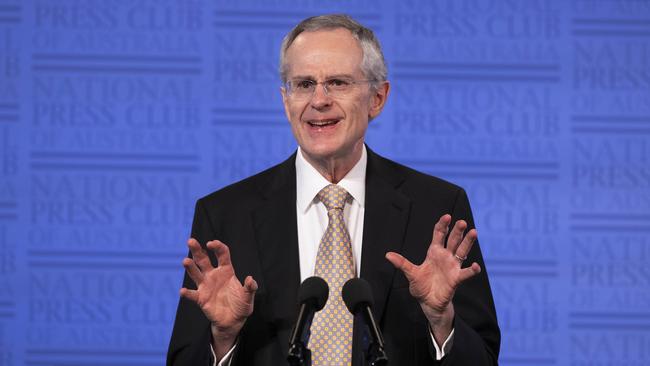Meta Platforms feeling the heat as regulators, courts apply blowtorch
A push to force Mark Zuckerberg-run Meta Platforms to sell Instagram and WhatsApp is gathering pace, in a focus on monopolistic behaviour in the tech industry.

A push to force Mark Zuckerberg-run Meta Platforms to sell Instagram and WhatsApp is gathering pace, as regulators and courts increasingly focus on monopolistic behaviour in the tech industry.
While most action is in the US, Australia’s competition watchdog is also examining the Meta monopoly, with a report slated for the federal government in September.
Already 2022 has started badly for Meta, formerly Facebook, with two significant US court losses. In Washington, the US District Court this month ruled that a Federal Trade Commission (FTC) antitrust case thrown out last year could now proceed.
The original case, filed in December 2020, accused the then Facebook of engaging in a “systematic strategy” of anti-competitive behaviour. The FTC was seeking a permanent injunction that could “require divestitures of assets, including Instagram and WhatsApp.”
A similar case was filed by 46 US states, the District of Columbia and Guam.
After those cases were lost, the FTC redrafted its arguments and this month scored a victory when a US District Court dismissed Meta’s protests and allowed the case to go to trial.
The original sticking point was the perceived lack of strength in the FTC claim about a Facebook monopoly. The victory has emboldened the states to resume their parallel case.
Meta’s Facebook also failed to stop antitrust litigation over an alleged anti-competitive pact with Google which supposedly deceived users into thinking their data was private when it was sold to third parties.
Across the Atlantic, Britain’s Competition and Markets Authority has ordered Facebook to unwind its acquisition of short looping video platform Giphy.
Dr Liza Lovdahl Gormsen from the British Institute of International and Comparative Law this month filed a class action against Meta on behalf of 44 million British users for allegedly breaching Britain’s competition law and exploiting the personal data of its users.
Additionally, the FTC and several US states have been delving into Meta’s anti-competitive behaviour involving virtual reality.

The investigation concerns the cost of competitors’ apps in the Oculus app store and the apparent subsidisation of the popular Oculus Quest 2 headset.
There are ongoing antitrust investigations in Europe over Facebook’s Marketplace classified-ad service and whether it improperly used advertiser details to compete with them in other markets.
There are major cases on other fronts, such as a $US150bn action by Rohingya refugees launched six weeks ago that accuses Meta of fanning the flames of hatred that led to genocide in Myanmar. Another recent case claims a connection between the killing of US federal police officer Dave Partrick Underwood and Meta’s inability to vet extremists’ posts.
Meta also faces reported legal action by a series of its content moderators in Europe.
Of course Meta is not the only big tech firm facing huge legal claims, with Alphabet, Amazon, Apple and Microsoft in the sights of regulators, but the knives are sharpening when it comes to Meta.
Locally, the Australian Competition & Consumer Commission is gearing up for a massive year developing a regulatory framework around Big Tech, having last year navigated the introduction of a media bargaining code which requires tech companies to pay media firms for their content.
An ACCC spokesman confirmed that antitrust is a central theme in 2022. The ACCC would continue to focus on digital platforms, including Meta/Facebook, under an ongoing formal direction from the Australian Treasurer, he said.
“We are now at the midpoint of the five-year direction and will be considering whether the current regulatory settings are appropriate to address competition and consumer concerns raised about digital platforms such as Facebook/Meta,” he said.
The spokesman said that Facebook and Google had spent significant sums acquiring companies, with Facebook buying 66 companies in the past 12 years.
The examination would begin with a discussion paper in the first quarter looking at competition issues and various regimes that had been adopted or proposed overseas, with a final report to be delivered to the Treasurer in September.

“We will continue to scrutinise other acquisitions by Facebook/Meta in 2022, particularly where the acquisition gives Facebook/Meta the ability to give itself an advantage by favouring its own products, or whether these acquisitions are raising barriers to entry for other competitors,” the spokesman said. “Currently the ACCC is continuing to investigate Facebook’s completed acquisition of Giphy.
“The ACCC has also instituted proceedings in the Federal Court against Facebook and two of its subsidiaries for false, misleading or deceptive conduct when promoting Facebook’s Onavo Protect mobile app to Australian consumers. These court proceedings are ongoing.”
The question remains whether the ACCC could effectively impose antitrust sanctions against Meta or other big tech firms when they are global companies and the ACCC has jurisdiction over just one country. The commission argues it does have broad jurisdiction on antitrust. It includes an ability to act even where the monopolistic actions take place outside Australia, such as an acquisition, if it is likely to substantially lessen competition in a market in Australia.
The commission could impose injunctions, penalties or require divestiture, the spokesman said.
“While global divestiture or a global injunction may not be feasible or appropriate, the remedies available to the Federal Court can be tailored and limited to addressing the impact on markets in Australia. This could include, for example, divestiture of that part of a firm’s business that involves the supply of goods or services in Australia.”
Meanwhile, the ACCC is taking Meta to task on other fronts, such as the pricing of rapid antigen tests on its platform and its policing of that. A Senate committee has been grilling it this week after it appeared to ignore a complaint by Australian broadcaster Erin Molan, who received online threats including a threat to rape her daughter. Facebook said it had lost the original complaint.
Australia, too, looks set to examine Big Tech further at a federal government level.
Scott Morrison, in early December, announced a parliamentary committee would look into the behaviour of the world’s largest technology firm and the need for new legislation.
“This is an issue that has burned in our hearts and our actions over the course of our government,” the Prime Minister said at the time.
US legislators finally have been getting into the act. The ball began rolling in June 2021 when six technology-focused bills were passed by the US House Judiciary Committee, which also summoned the chief executives of Facebook, Amazon, Alphabet and Apple to antitrust hearings the following month.
While progress has been slow since, there has been movement this week, with a US Senate Judiciary Committee approving an antitrust measure that stops those four companies favouring their products over competitors’ alternatives.

There was concern expressed that the Bill targets only four Big Tech firms, so it was amended to include foreign-owned platforms such as TikTok, according to The Wall Street Journal.
The Bill passed 16 to six, which shows reasonably broad support.
However, the money being spent by Big Tech on lobbying to halt reform appears to have slowed movement in the US House of Representatives.
Time will tell.
Not every tech firm is against antitrust reforms: Sonos and Yelp are among companies backing change.
In the end Capitol Hill will have to show strength if it is to pass laws that prevent big tech companies gobbling up even more firms.
One litmus test could be Microsoft’s proposed $US69bn ($96bn) acquisition of Call of Duty game maker Activision Blizzard, announced this week.
There are already suggestions that the deal should be examined by US antitrust regulators.
However, Rob Nicholls of the UNSW Business School is pessimistic about whether legislative moves will get anywhere.
“If the Biden administration can’t get changes to the filibuster, or its own social security changes, or voting law changes through the Senate, it’s not going to be able to get antitrust changes through,” Dr Nicholls said.
While it’s known some Democrats are opposed to the reforms, he fears some Republican legislators might fear oil companies and other Republican donors may be drawn into it.
Dr Nicholls is more optimistic about change through the courts and regulation. “Why go through the pain and the expenditure of political capital, trying to get through legislation … when you can potentially do it through existing mechanisms?
“The signalling that comes through the court process can be dealt with by the regulators much more quickly.
“In effect, the court process provides information to the regulators which will help them to hone their regulatory approach, even though the court‘s decision might not be known for a few years yet, so I think those two together act as a sort of pincer movement.”
Whatever the case, Big Tech, including the likes of Meta, is firmly within the sites of regulators, legislators and the courts. It will be a fascinating 2022.





To join the conversation, please log in. Don't have an account? Register
Join the conversation, you are commenting as Logout